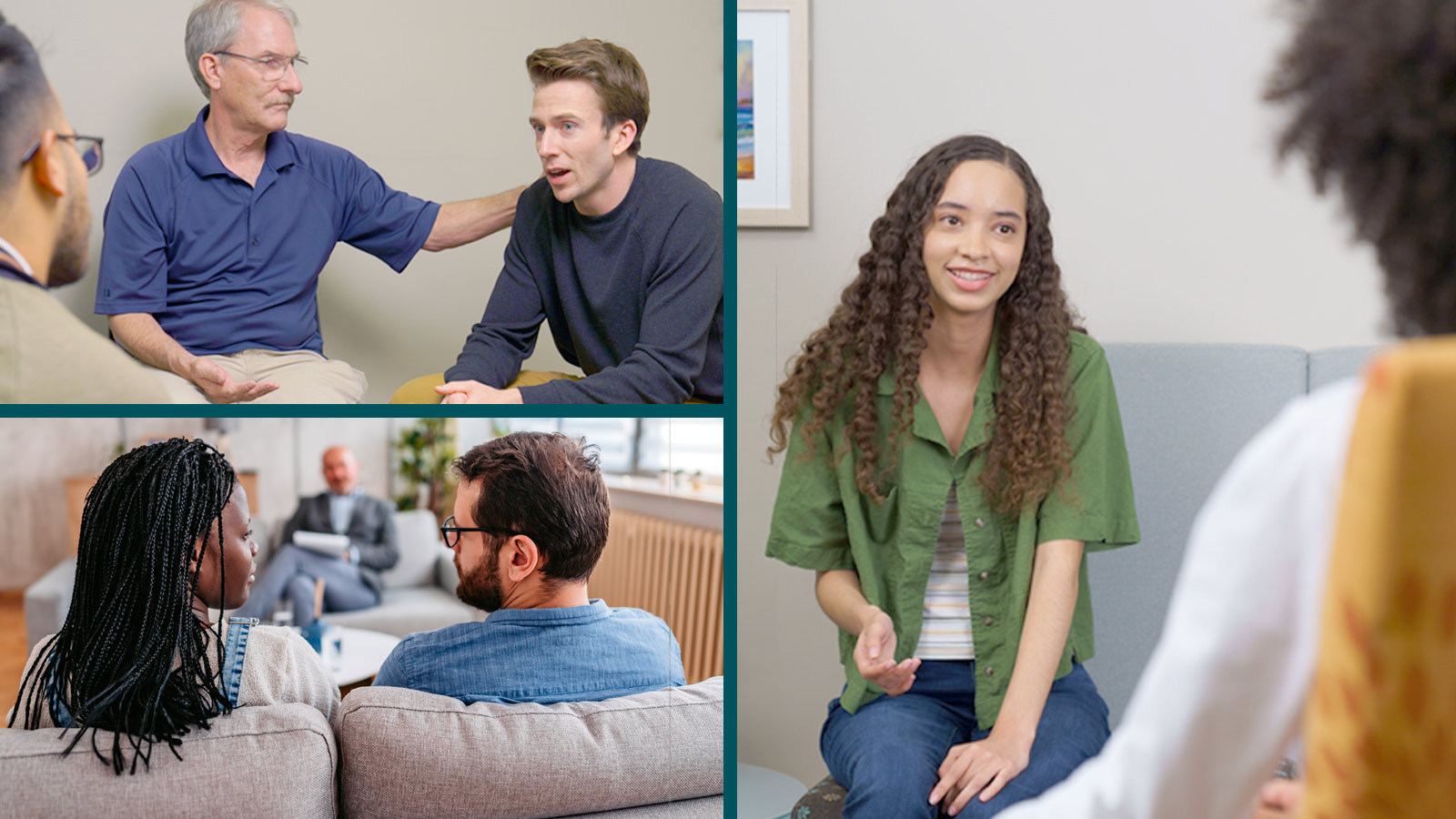If you’re thinking of pursuing a master’s degree in counseling, odds are you have a desire to help people change their lives for the better. But did you know you can leverage your professional skills and knowledge in many different ways?
There is a wide array of professional career paths that can stem from a counseling master’s degree, whether it’s done in the private or public sector, in one-on-one counseling sessions or in groups, or in a general and/or specialized area or practice.
To help you better understand the many career options that are available — both traditional and alternative careers for counselors — here are 10 professional roles that are commonly filled by individuals with master’s degrees in counseling or similar fields of study.
Please make sure to research the educational, fieldwork, and licensure requirements for each pathway within your state, as it can vary depending on your location.
10 Counseling-Related Career Paths to Consider
1. Mental Health Counselor
Mental health counselors are licensed professionals who help individuals learn how to address and cope with challenges that are affecting their mental and emotional health, such as distressing thoughts or emotions and unhealthy or unproductive behaviors.
Mental health counselors may work with individuals suffering from challenges such as stress, anxiety, grief, post-traumatic stress disorder (PTSD), eating disorders, phobias, different gender identities, and more. These types of professionals are focused on helping clients identify the context for these challenges and teaching them strategies for overcoming those barriers so they can live happier, healthier, and more fulfilling lives.
Clinical mental health counselors may work with individuals, couples, or groups, and they may work in private practice, for public agencies, or for community organizations.
To become a clinical mental health counselor, you will typically need to earn a master’s degree
in counseling, completion of a certain number of supervised counseling practice hours, and a
license in your state.
2. School Counselor
The role of a school counselor is to provide students with resources that help them thrive in their academic and personal lives. Some of the duties of school counselors include helping students with academic planning and goal setting, helping them prepare for next steps after graduation (such as applying for colleges, signing up for military, or preparing to enter the workforce), and guiding them through emotional and interpersonal growth.
With ideal caseloads of 250 students per school counselor, school counselors’ work with students is more limited in scope (compared to a clinical mental health counselor in private practice), and as such, they may refer the student to other licensed professionals to address more extensive counseling needs. School counselors work closely with parents/guardians, teachers, and school administrators to help ensure that students are prepared for success.
The path to becoming a school counselor varies and requirements can differ from state to state. You may need a master’s degree in school counseling or a related field and a state-issued credential. Or you may need to have served as a teacher for a certain number of years before pursuing a master’s degree in counseling. In some states, licensure for career counselors and advisors is required.
3. Substance Abuse / Addiction Counselor
Substance abuse counselors, also known as addiction counselors, help individuals who struggle with being addicted to controlled substances such as alcohol or opioids. Addiction counselors may also assist clients with other types of dependencies, such as gambling, pornography, or video games.
Substance abuse or addiction counselors may help their clients through one-on-one counseling sessions or through group counseling, such as in support groups. Common duties of a substance abuse or addiction counselor include, but are not limited to:
- Assessment of the severity of the client’s addiction and their readiness for treatment
- Development of personalized treatment plans
- Referrals to other healthcare and social services as needed
- Psychotherapy for clients
- Education of loved ones for how to support the client
- Possible documentation for case management
Common work environments for substance abuse and addiction counselors include private practice, mental health centers, community health centers, and residential treatment facilities.
4. Career Counselor
Career counselors provide guidance to help people find the right career path, grow in their existing career path, or make a big career change. This type of counseling may be offered in educational, work, or community settings.
In providing this guidance, career counselors will consider the client’s job skills, values, experience, and personal preferences. Some of the duties of a career counselor may include administering career aptitude tests, assisting the client with career planning, teaching the client job search strategies, advising the client on opportunities for professional growth, and more.
5. Residential Counselor
Residential counselors work in residential facilities such as shelters, group homes, residential care facilities, rehabilitation centers, and youth camps.
Common duties of residential counselors include supervising residents, observing and documenting their behaviors and mental attitudes, monitoring their progress, facilitating day-to-day activities and support groups, providing one-on-one counseling, and making referrals to community resources.
6. Rehabilitation Counselor
Rehabilitation counselors help individuals with physical, mental, emotional, or developmental disabilities learn how to live independently and engage in employment. Some of their common work environments include rehabilitation centers, senior citizen centers, and youth-focused organizations.
Some of the duties of a rehabilitation counselor may include, but are not limited to:
- Assessing abilities and interests to develop appropriate treatment plans
- Helping clients adjust to their limitations and build up their strengths
- Providing counseling to people with disabilities either one-on-one and in groups
- Connecting clients with necessary resources (such as career training or medical services)
To become a rehabilitation counselor, you typically need a master’s degree in rehabilitation counseling or a related field. Some positions require certification or a license.
7. Military Counselor
Military counselors deliver mental health services to active military members, veterans, and military families. These counselors are equipped to help their clients cope with challenges that are common to the military community such as PTSD, depression, anxiety, substance abuse, marital issues, and adjustment to civilian life (upon transitioning out of the military). Military counselors may provide individual or family counseling sessions.
Common work environments for military counselors include military installations, mental health centers, medical practices, veteran clinics, employee assistance programs (EAPs), and homeless shelters.
8. Licensed Marriage and Family Therapist
Licensed marriage and family therapists (LMFTs) are mental health professionals who help clients overcome mental, emotional, and behavioral health issues through the lens of marriage, couples, an family systems. LMFTs typically focus on short-term, solution-focused counseling with attainable therapeutic goals. (The average case of a licensed marriage and family therapist lasts 12 sessions, according to the American Association of Marriage and Family Therapy.)
To become an LMFT, you generally need to complete a graduate-level degree (a master’s or doctoral degree) in marriage and family therapy.
9. Psychologist
Some individuals who begin their educational journey with a focus on mental health counseling may discover that they want to pursue a career as a psychologist. While mental health counselors focus on equipping their clients with strategies for coping with mental health, emotional, and behavioral challenges on a day-to-day basis, psychologists focus more deeply on the science, theory, assessment/diagnosis, and practice of psychology.
They may conduct psychological and neuropsychological testing and they are usually more likely to treat clients with severe mental illnesses (i.e., psychosis or personality disorders). Psychologists may also be involved in clinical research.
To become a psychologist, you will need a doctoral degree, such as a doctorate in philosophy (PhD) or a doctorate in psychology (PsyD).
10. Social Worker
Some individuals who earn a college degree in counseling go on to become social workers. Professionals in this role help people overcome challenges and address needs in their everyday lives, which can include anything from dealing with substance abuse to navigating the process of adopting a child.
Social workers typically assess the needs of people and communities, help clients find ways to adjust to life challenges, refer clients to the appropriate resources available in their community, respond to crisis situations (such as claims of child abuse), follow up with clients to determine whether their situations have improved, and more.
Licensed clinical social workers (LCSWs) can perform duties that unlicensed social workers cannot, which usually include diagnosing and treating clients’ mental, behavioral, and emotional issues.
A few common work environments for social workers include child welfare and human service agencies, healthcare organizations, and schools.
Pursue a Master’s Degree in Mental Health Counseling
Depending on your desired career path, you may be interested in enrolling in West Coast University’s Master of Science in Clinical Mental Health Counseling program, which can be completed in as little as 29 months. Explore the program and speak to a member of the WCU team to find out if this program is the right fit for you!
WCU provides career guidance and assistance but cannot guarantee employment. The views and opinions expressed are those of the individuals and do not necessarily reflect the beliefs or position of the school or of any instructor or student.



